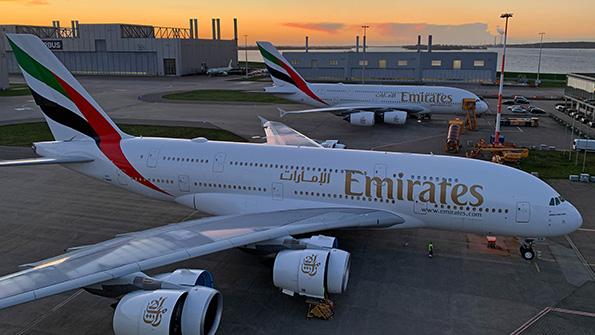A380 Cracking Issue Will Not Change Storage Guidance, Airbus Says

A wingbox inspection mandate is partly driving which A380s Emirates is bringing back to service.
A certain combination of heat and humidity is forcing Airbus A380 operators to tighten an established wing-spar inspection program and causing some to change fleet deployment plans.
A May 11 European Union Aviation Safety Agency directive requires A380 operators to calculate “factored time on ground” (FTOG) and conduct inspections based on Airbus’ revised criteria. The mandate is based on a May 11 Airbus operators’ telex.
The new mandate builds on existing inspection criteria for A380 wingbox areas—the top and bottom flanges of the outer rear spar (ORS) between Ribs 33 and 49, the outer inner front spar between Ribs 8 and 14 and the outer front spar between Ribs 38 and 49. The original directive was issued in 2019, covering only part of the affected area and setting inspection thresholds starting 15 years after the wingbox assembly date. Feedback from operators and additional work by Airbus prompted subsequent directives expanding the areas that needed checks and shortening the inspection thresholds. A 2022 directive required ORS inspections 11.5 years after the wingbox assembly date.
The new criteria affect only the ORS area. Airbus has flagged a phenomenon called hydrogen-assisted cracking, or hydrogen embrittlement, as the cause of accelerated crack development on A380s that have been stored for extended periods of time.
“The biggest driver is temperature; the second is moisture,” Pierre-Henri Brousse, head of the A380 program, tells Aviation Week. When aircraft are on the ground and exposed to extreme weather conditions, hydrogen is diffused into the materials and causes embrittlement of the aluminum alloy, which in turn makes the propagation of cracks easier, he explains. A combination of FTOG, the aircraft’s age and a maximum takeoff weight threshold of 510 tons are considered when determining the new check intervals.
But that remained insufficient. “We inspected some aircraft that were younger than the threshold” in the 2022 directive, Brousse says. “And we had some findings.”
Airbus then launched a deep dive into the data to try to understand why aircraft as young as 10 years (after wingbox assembly and therefore with sometimes significantly fewer years in revenue service) were developing the cracks. “We accumulated a sample that became statistically relevant,” Brousse says. Eventually, the research yielded results—namely that storage conditions have an effect on how fast the cracking develops.
Among the new triggers for ORS inspections is an aircraft returning to service after 12 or more months in storage. Wing inspections take about one week, and the nondestructive checks are typically performed by airlines in-house.
Many current A380 operators are in the process of returning more aircraft from storage, given how quickly demand has rebounded on long-haul routes and supply chain issues that have held up some deliveries. The Aviation Week Network’s Fleet Discovery database shows 135 A380s are in active service, with Emirates operating 87 of them, Singapore Airlines and British Airways each flying 11, and Qatar Airways and Qantas operating seven and six, respectively.
Airbus has not said which operators have been hit hardest by the issues, but Emirates said in November 2022 that it has been affected. The airline had parked many of its A380s at Al Maktoum International Airport during the coronavirus pandemic, where they were exposed to particularly high temperatures and humidity during summer. Emirates has returned younger aircraft first to avoid running into inspection intervals for as long as possible.
Qatar Airways and Etihad are two more Gulf carriers with A380 fleets, though Etihad is beginning only now to return its A380s to service.
Airbus says the recent findings will not “substantially change” its recommendations for aircraft storage. The aluminum alloy of the affected spars is no longer used in any other Airbus aircraft and is changed to a different material when parts are replaced during repairs.
“We have no concerns for other components,” Brousse says.

